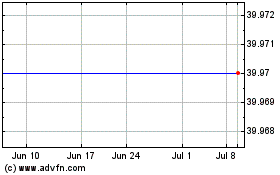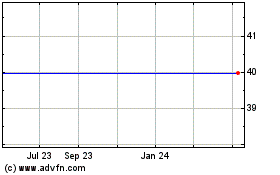By Alexander Osipovich
Wall Street has roared its approval for Charles Schwab Corp.'s
plan to buy TD Ameritrade Holding Corp., but the proposed deal
isn't sitting well with one key group: the financial advisers who
park their clients' money with the big online brokerages.
On Monday, Charles Schwab said it agreed to buy smaller rival TD
Ameritrade in a stock-swap transaction valued at about $26
billion.
Registered investment advisers, or RIAs, rely on brokerages
including Schwab, TD Ameritrade and Fidelity Investments to execute
trades, hold clients' assets and perform related services such as
record-keeping, a business known as custody.
The $26 billion merger would create a behemoth in that world. A
combined Schwab-TD Ameritrade would have nearly $2.1 trillion of
advisers' assets in custody, or around 51% of the market, according
to estimates by Cerulli Associates. The No. 2 player in the space,
Fidelity Investments, has about $932 billion in RIA assets, or less
than a quarter of the market, Cerulli estimates.
That scale helped drive the sharp gains in the shares of both
Schwab and TD Ameritrade last week, but it has also sparked worries
about deteriorating service and less choice for advisers.
"The adviser community is not particularly upbeat about this
news," said Michael Kitces, a partner and the director of wealth
management at Pinnacle Advisory Group, which manages about $2
billion for its clients. "There's not a lot of upside that's
visible to them."
On a Monday conference call with analysts, Schwab President and
Chief Executive Walt Bettinger said: "We're very confident
that...the combined organization will remain the premier custodian
for independent investment advisers. And I think that as the dust
settles, independent investment advisers will agree with that
assessment."
A TD Ameritrade spokeswoman referred requests for comment to
Schwab, which referred a reporter to executives' comments on the
conference call.
Schwab is currently the biggest RIA custodian, with around $1.5
trillion in assets and more than 7,500 financial advisers. Schwab
helped the financial-adviser industry gain momentum in the 1990s by
creating the Schwab Advisor Services platform, which made it easier
for advisers to set up shop independently and compete with
stockbrokers at big brokerage firms such as Merrill Lynch.
TD Ameritrade has more than 7,000 advisers, which tend to manage
less money than those at Schwab, while Fidelity has around 3,000.
Other players in the space include Pershing, an arm of Bank of New
York Mellon Corp., and E*Trade Financial Corp., which itself has
been seen as a potential acquisition target.
Consolidation in industries can sometimes help consumers by
letting companies achieve greater efficiencies, allowing them to
cut prices. That is part of why Amazon.com Inc. can undercut
smaller retailers on prices for the goods it sells.
But in the online-brokerage world, fees are already at rock
bottom: Schwab, TD Ameritrade, Fidelity and other e-brokers lowered
commissions for online stock trades to zero in October. They make
much of their money from RIAs and individual investors by
collecting interest on cash balances.
That means advisers don't have much to gain from further
e-broker price cuts. Instead, advisers worry that the main effect
they will feel from a Schwab-TD Ameritrade deal is worse customer
service, along with technology hiccups as the two firms
integrate.
"All of us out there are questioning whether you can maintain
service quality at that size," said Brice Carter, chief investment
officer at Financial Strategies Group Inc., an Okemos, Mich.-based
advisory firm.
For an adviser, switching from one custodian to another
typically involves getting the signoff of every client affected, as
well as a significant amount of paperwork. If an adviser is unhappy
with the service a custodian is providing, that process makes it
difficult to decamp for a rival custodian, said Mr. Carter, whose
firm manages about $280 million in client assets, much of which are
with TD Ameritrade.
Increasing concentration of the RIA custody business could be a
red flag for regulators, some analysts have warned.
"This deal may face somewhat significant antitrust hurdles,
depending on how the competitive market is viewed by relevant
authorities," analysts at Keefe, Bruyette & Woods said in a
note.
KBW, whose approach to modeling market share is different from
Cerulli's, estimated that Schwab has roughly 50% of the RIA custody
business, while TD Ameritrade has between 15% and 20%. Such
estimates can differ because some custodians, such as Fidelity, are
privately owned and don't release detailed data.
Mr. Bettinger, the Schwab CEO, voiced confidence that the deal
would pass antitrust review and be completed by late next year.
Speaking on the conference call, he said Schwab and TD Ameritrade
had a "much more modest" share of the RIA custody business than
some analysts and media reports had said.
The other big group of customers at Schwab and TD Ameritrade --
investors and individual traders who use the firms' platforms to
manage their portfolios -- may see benefits from a deal, said Blain
Reinkensmeyer, head of research at StockBrokers.com, a website that
reviews e-brokers.
Schwab users could benefit from access from TD Ameritrade's
sleeker trading tools, while TD Ameritrade users might benefit from
access to Schwab's market research and commentary, Mr.
Reinkensmeyer said.
Still, he added, investors could suffer in the long run if
consolidation among online brokerages slows down the companies'
efforts to please customers with new offerings.
"Schwab's acquisition of TD Ameritrade could negatively impact
self-directed investors long term," Mr. Reinkensmeyer said. "Yes,
there are obvious synergies for customers of both firms, but
removing competition comes with the secondary punch of reducing
innovation."
Write to Alexander Osipovich at
alexander.osipovich@dowjones.com
(END) Dow Jones Newswires
November 25, 2019 10:54 ET (15:54 GMT)
Copyright (c) 2019 Dow Jones & Company, Inc.
TD Ameritrade (NASDAQ:AMTD)
Historical Stock Chart
From Mar 2024 to Apr 2024

TD Ameritrade (NASDAQ:AMTD)
Historical Stock Chart
From Apr 2023 to Apr 2024
